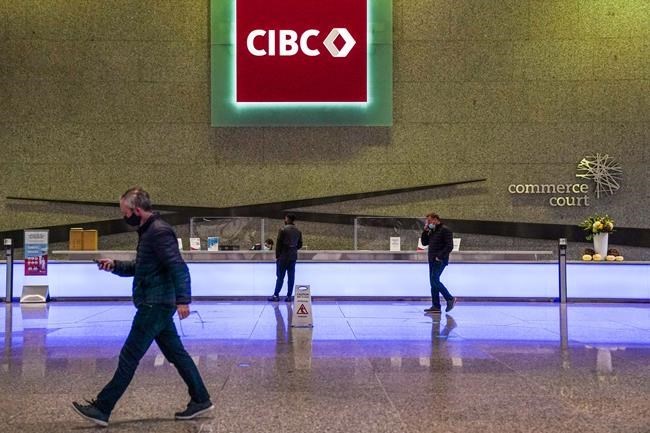TORONTO — CIBC reported Thursday that its revenue climbed in the second quarter compared with last year, but earnings dipped as both spending to power growth and provisions for potential future loan losses ate into profits at a time of increased uncertainty.
"There's no doubt we're all in a very fluid environment," said chief executive Victor Dodig on an earnings call.
"First and foremost, our thoughts are with those who have been affected by the war in Ukraine. Beyond its human impact, the conflict has exacerbated COVID-related supply chain disruptions, and contributed to inflationary pressures around the globe. Central banks, around the globe, are responding by raising interest rates to cool inflationary pressures, which is leading concerns to an economic slowdown."
While uncertainty is increasing, the bank still saw substantial growth with revenue of $5.38 billion, up nine per cent from a year ago on broad-based loan and deposit growth, higher fee income and strong client-based trading activity. Revenue did, however slip 2.3 per cent from the previous quarter.
The spikein revenue from last year comes after CIBC has been spending heavily on organic growth, including investments in its U.S. operations, while it also bought Costo's credit card portfolio to secure two million cardholders with the hope of luring many of them into other bank products.
The investments, along with increased operating costs due to inflationary pressures, pushed expenses up 11 per cent from a year earlier, including an 18 per cent jump in its U.S. commercial and wealth division.
CIBC expects expense growth to moderate in fiscal 2023 as it completes its "foundational investments," said chief financial officer Hratch Panossian.
The bank diverged from other banks in raising its credit loss provisions in the quarter, up an adjusted $209 million, or $303 million with the inclusion of the impacts of the Costo credit card portfolio, on what it said was increased risk from rising interest rates and higher spending at a time of increased uncertainty.
"We are, of course, monitoring closely for potential impacts from the pandemic, the inflation and rate environment and broader geopolitical developments that could affect our outlook," said chief risk officer Shawn Beber.
CIBC is still seeing strong business confidence despite some of the uncertainty, though the mood has dipped from three months ago, said Jon Hountalas, head of commercial banking.
"It's still strong. It's a nudge down for sure, but people are still feeling good. Demand for product is there. price increases continue to get passed on. Labour remains a challenge. Supply chain is hit and miss. Some people tell me it's getting better, some people worse. But overall, people remain confident."
The expenses and provisions for credit loss weighed on profits, which came in at $1.52 billion for an eight per cent loss from last year, or an adjusted $1.65 billion for a one per cent drop.
On an adjusted basis, CIBC says it earned $1.77 per diluted share in its latest quarter, down from an adjusted profit of $1.79 per diluted share a year earlier.
Analysts on average had expected an adjusted profit of $1.78 per diluted share for the bank's second quarter, according to financial markets data firm Refinitiv.
"Results were weighed down by higher-than-expected PCLs ... as the bank incorporated an unfavourable change in the economic outlook," said Scotiabank analyst Meny Grauman in a note.
"That masked continued revenue growth momentum which was driven in part by better-than-expected trading revenues."
The bank said Thursday it will now pay a quarterly dividend of 83 cents per share, up from 80.5 cents per share.
The bank said its Canadian personal and business banking business earned $496 million for the second quarter, down from $603 million a year ago, due to a higher provision for credit losses and higher expenses, partially offset by higher revenue.
Meanwhile, the CIBC's Canadian commercial banking and wealth management business earned $480 million for the quarter, up from $399 million a year ago, helped by higher revenue, partially offset by higher expenses and lower provision reversal.
CIBC's U.S. commercial banking and wealth management arm earned $180 million, down from $216 million a year ago, while its capital markets business earned $540 million, up from $495 million in the same quarter last year.
This report by The Canadian Press was first published May 26, 2022.
Companies in this story: (TSX:CM)
Ian Bickis, The Canadian Press



